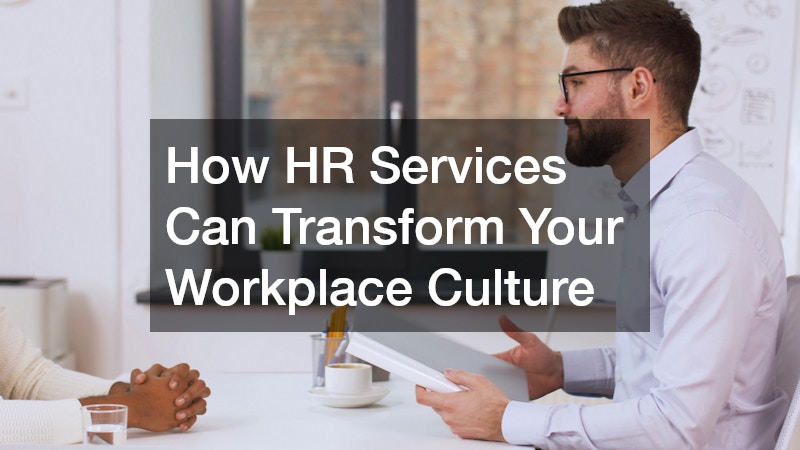In today’s competitive business landscape, a positive workplace culture is more than just a nice-to-have — it’s essential for attracting and retaining top talent, boosting employee morale, and driving productivity. However, cultivating and maintaining a strong workplace culture isn’t always easy. This is where professional HR expertise can make a significant difference. By leveraging HR services, organizations can create environments where employees feel valued, motivated, and engaged.
Understanding Workplace Culture and Its Importance
Workplace culture refers to the shared values, beliefs, attitudes, and behaviors that shape how employees interact and work together. It impacts everything from daily communication to long-term strategic decisions.
A healthy culture fosters collaboration, innovation, and a sense of belonging — all of which are critical for employee satisfaction and performance.
When culture is neglected, however, companies often face high turnover, low morale, and even reputational damage. Studies show that employees who feel connected to their company’s culture are significantly more likely to stay and perform at their best. Therefore, businesses must invest in cultivating a positive culture to remain competitive.
The Role of Human Resources in Shaping Culture
Human resources professionals have always been key players in managing talent, but their role in shaping workplace culture has become increasingly strategic. HR teams understand the subtle dynamics that influence employee engagement and know how to implement policies that encourage inclusivity, fairness, and recognition.
Effective human resources functions provide the framework and tools necessary to build a culture aligned with your company’s vision and goals. From recruitment practices that prioritize cultural fit to employee development programs and conflict resolution, HR professionals act as culture champions within an organization.
How HR Teams Enhance Communication and Collaboration
One of the most impactful ways HR departments transform workplace culture is by improving communication channels. Miscommunication or lack of transparency can create distrust and frustration among employees. HR teams design and implement communication strategies that promote openness and clarity.
For example, regular employee feedback surveys, town halls, and one-on-one meetings help management understand employee concerns and address them proactively. Human resources also foster collaboration by encouraging team-building activities and creating spaces where employees feel comfortable sharing ideas. These initiatives build trust and break down silos, leading to a more cohesive work environment.
Promoting Diversity, Equity, and Inclusion
Diversity and inclusion have become top priorities for modern businesses, and human resources professionals play a crucial role in advancing these values. A diverse workforce brings a range of perspectives and experiences that fuel creativity and innovation. However, achieving true inclusivity requires intentional policies and practices.
HR specialists help organizations develop recruitment strategies that widen the talent pool and remove biases from hiring processes. They also create training programs that educate employees on cultural awareness and sensitivity. By embedding equity and inclusion into the company’s DNA, human resources help build a culture where every individual feels respected and empowered to contribute.
Supporting Employee Growth and Development
Employees want to feel that their employer invests in their growth. When people see opportunities to learn new skills and advance their careers, they are more likely to remain engaged and loyal. Human resources facilitate professional development through training programs, mentorship, and clear career pathways.
By aligning development initiatives with employee goals and company needs, HR fosters a culture of continuous improvement. This not only benefits individuals but also enhances overall organizational performance. Furthermore, recognizing and rewarding achievements strengthens morale and motivates others to strive for excellence.
Creating a Positive Work Environment
A supportive work environment goes beyond perks and benefits. It involves creating conditions where employees feel safe, valued, and supported both professionally and personally. Human resources contribute to this by establishing policies around work-life balance, mental health support, and conflict management.
Offering flexible schedules, wellness programs, and employee assistance resources demonstrates a commitment to employee well-being. HR professionals also mediate conflicts before they escalate, ensuring that workplace relationships remain respectful and productive. When employees feel cared for, the workplace culture flourishes.
Measuring and Sustaining Cultural Success
Transforming workplace culture is an ongoing process, not a one-time project. HR services help businesses track the effectiveness of culture initiatives by collecting data through surveys, performance reviews, and retention metrics. This feedback loop allows companies to identify areas of strength and opportunities for improvement.
By regularly revisiting cultural goals and adapting strategies, organizations can sustain a positive environment that evolves with their workforce. HR professionals serve as culture stewards, ensuring that values remain aligned with changing business needs and employee expectations.
A thriving workplace culture is a powerful asset that drives employee satisfaction, innovation, and business success. Investing in expert HR services is one of the most effective ways to build and maintain such a culture. From fostering open communication and promoting diversity to supporting growth and well-being, HR professionals help create an environment where employees feel engaged and motivated.
Ultimately, companies that prioritize their culture through strategic HR initiatives not only attract and retain top talent but also build a resilient organization ready to meet future challenges. If you’re looking to transform your workplace culture, partnering with skilled HR experts can set you on the right path to achieving lasting, positive change.





